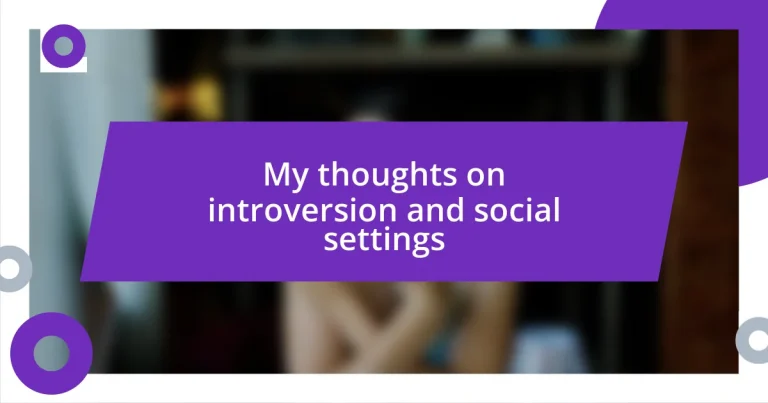Key takeaways:
- Introversion and extroversion exist on a spectrum, influencing social navigation and the need for balance in interactions.
- Introverts often prefer depth in conversations, meaningful connections, and may struggle in noisy or overwhelming social settings.
- Building confidence in social interactions can be achieved through preparation, achievable goals, and self-compassion, ultimately embracing introversion as a strength.
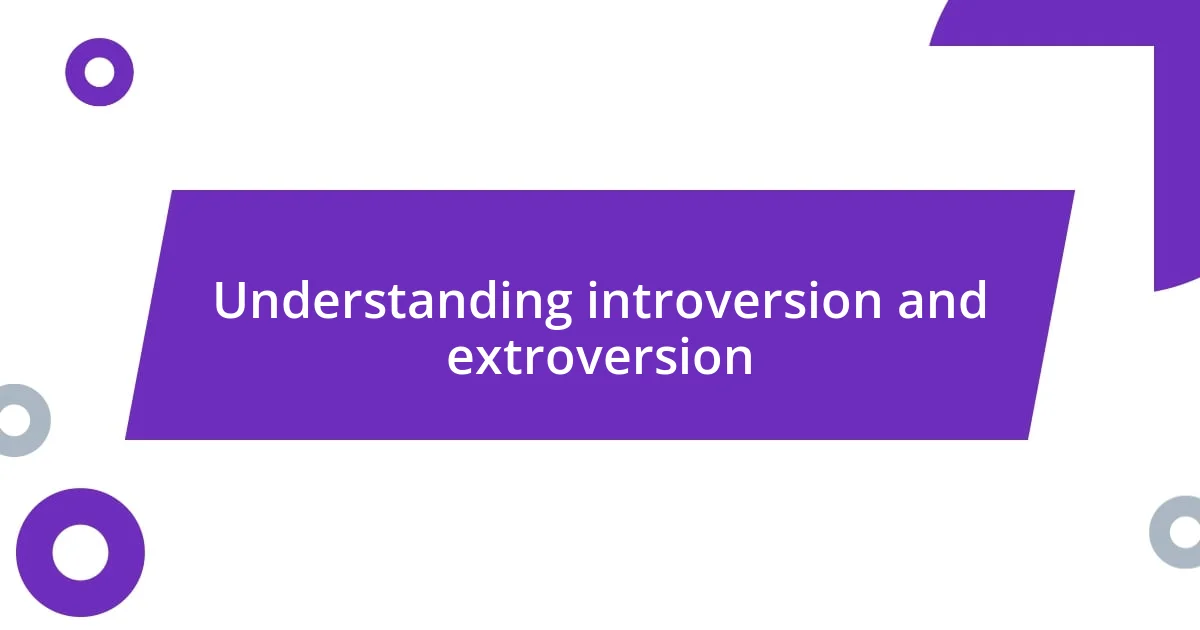
Understanding introversion and extroversion
Understanding introversion and extroversion isn’t just about where we draw our energy from; it’s a spectrum that influences how we navigate our environments. I remember a time when I was invited to a large gathering. As soon as I walked in, the buzz of conversation felt overwhelming, and I found myself gravitating towards a quieter corner—an instinctive choice that spoke volumes about my introverted nature. Have you ever felt that way in a crowd?
On the other hand, I’ve seen extroverts thrive in those same situations, effortlessly making connections and soaking in the energy around them. Their desire for social interaction can sometimes leave introverts feeling sidelined. Isn’t it fascinating how different we can be? It’s not inherently better to be one or the other; it’s about recognizing and respecting our individual needs and preferences.
Most importantly, understanding introversion and extroversion can foster deeper connections. When I acknowledged my need for downtime after social events, it changed how I approached my friendships. I’ve noticed that when extroverted friends understand this about me, our interactions feel more balanced and meaningful. How do you navigate your own spectrum of social preferences?
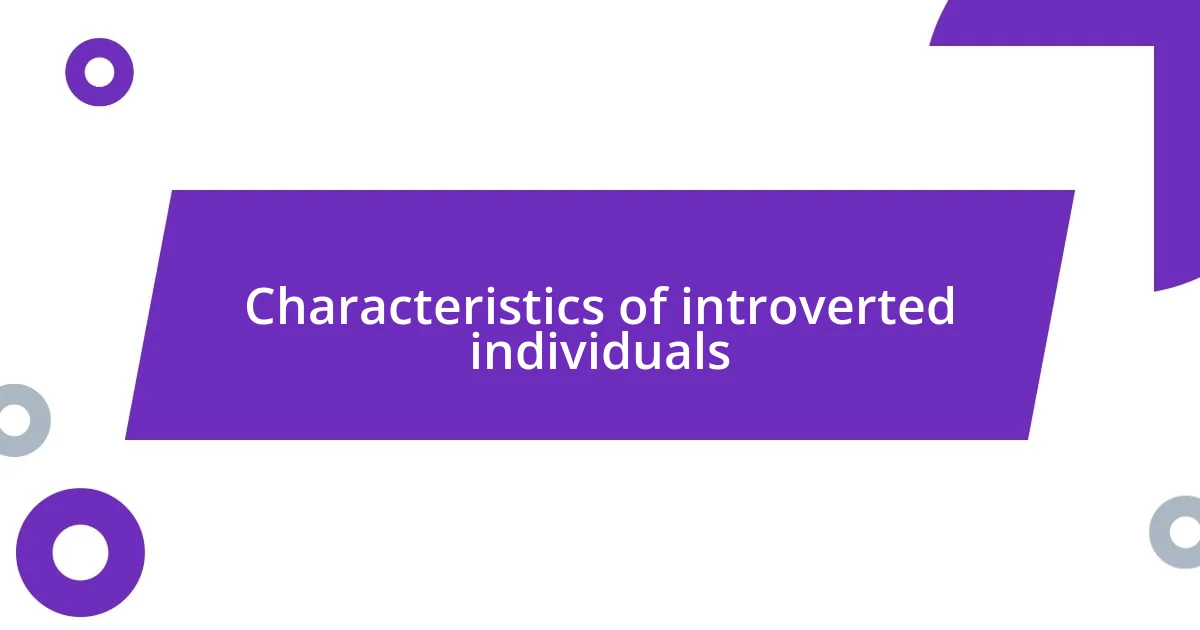
Characteristics of introverted individuals
Introverted individuals often exhibit unique characteristics that shape how they engage in social settings. For me, one of the most telling traits is the preference for depth over breadth in conversations. I’ve often found that sharing meaningful ideas with a close friend feels far more fulfilling than making small talk with a room full of acquaintances. This tendency toward intimate, one-on-one interactions can sometimes create an atmosphere of solitude even in crowded spaces.
Here are some key characteristics of introverted individuals:
- Deep Thinkers: Introverts tend to process information internally and reflect deeply before responding.
- Introspective Nature: They often enjoy solitude, using it as a time for self-reflection and recharging their energy.
- Preference for Meaningful Connections: Introverts typically prefer a few close relationships over a wide network of acquaintances.
- Quiet Observers: They may enjoy observing social dynamics rather than participating actively, finding insights in their surroundings.
- Sensitivity to Overstimulation: Introverts can feel overwhelmed by loud or busy environments, seeking quieter spaces for comfort.
In my experience, these traits can be both a gift and a challenge. There have been many moments when I’ve felt misunderstood in lively gatherings, yearning for that serene corner to gather my thoughts. Yet, this introspective nature also brings a rich, inner life and a profound appreciation for the subtleties of human connection.
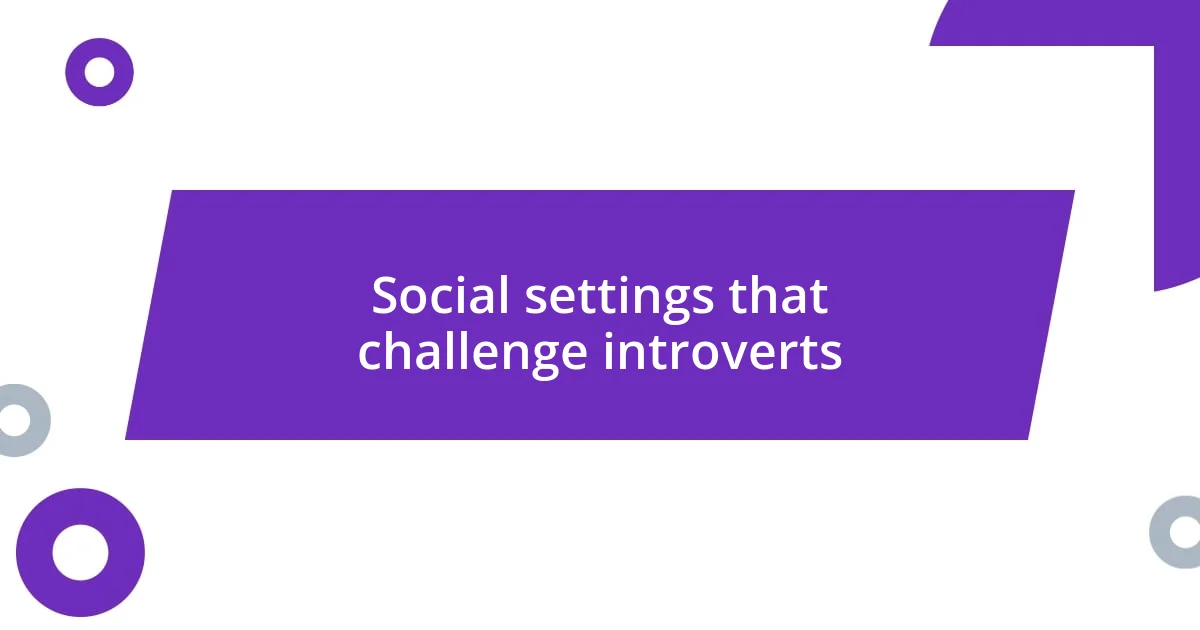
Social settings that challenge introverts
Social settings that challenge introverts often include large gatherings, like parties or networking events. I recall attending a wedding once, surrounded by hundreds of people. The din of laughter and chatter felt suffocating, and I found myself retreating to a quieter space with a close friend—true solace amidst the chaos. Have you ever experienced that urge to disconnect just to recharge?
Another setting that can feel particularly daunting is a bustling conference or seminar. While there’s value in networking, the pressure to approach strangers always makes my heart race. I remember navigating a crowded room where everyone seemed in their element, chatting and exchanging business cards. It was in those moments that I wished for a little more encouragement to start conversations, rather than feeling the weight of expectation on my shoulders.
Finally, casual social settings like coffee shops can also be tricky. I’m often torn between wanting to meet someone for a chat and the fear of it turning into a loud, chaotic scene filled with distractions. Once, I met a friend at a popular café, but the noise level made it hard to engage meaningfully. We ended up retreating to the quieter corner, which made a world of difference. Finding that balance in social environments is crucial for introverts like me.
| Social Setting | Challenge for Introverts |
|---|---|
| Large Gatherings | Overwhelming noise and social pressure can exhaust introverts quickly. |
| Networking Events | The need to initiate conversations with strangers can be intimidating. |
| Coffee Shops | Noise and distractions can hinder meaningful interactions. |
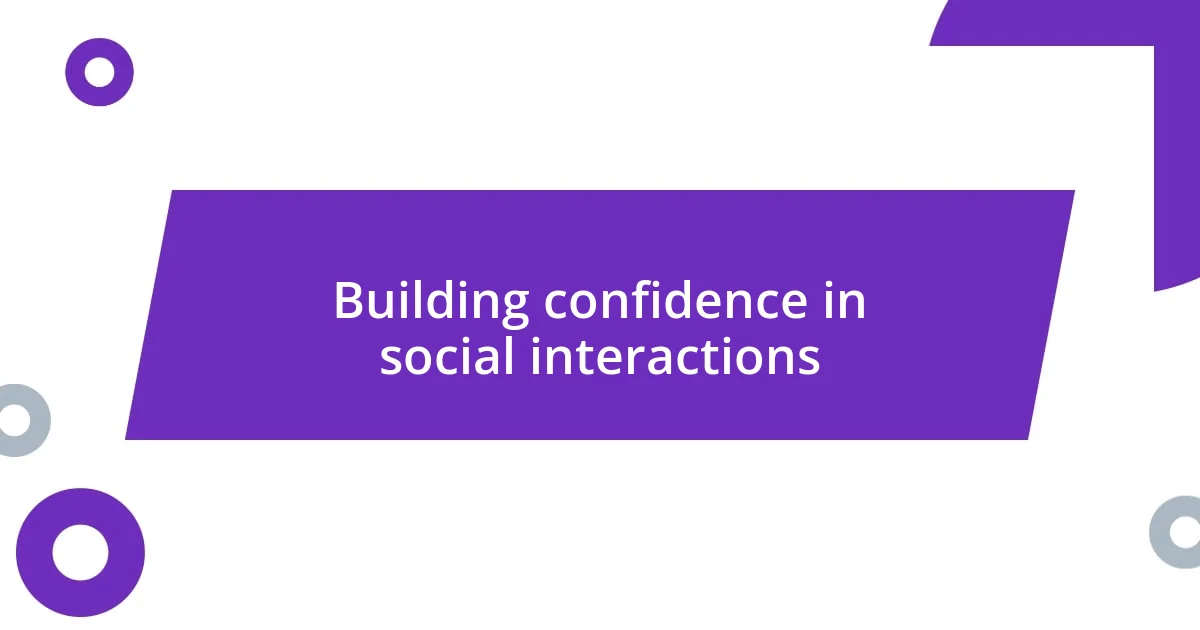
Building confidence in social interactions
Building confidence in social interactions is a journey that many introverts can relate to. When I first entered a bustling social scene, I often felt like a fish out of water, overwhelmed by the energy around me. But I’ve learned that preparing a few conversation starters, like a recent book I enjoyed, can ease that pressure. It’s incredible how a well-thought-out topic can spark curiosity and connection, transforming a potentially awkward moment into an engaging dialogue.
Another key to building confidence, I’ve found, is setting small, achievable goals for social outings. For instance, I would aim to have a conversation with at least one new person at gatherings. This approach not only minimized my anxiety but also gave me a sense of accomplishment each time I left an event. Have you ever noticed how breaking things down into bite-sized pieces can make daunting tasks less intimidating?
Over time, I’ve come to appreciate the value of self-compassion. There were evenings when I returned home after trying to engage, only to feel drained and a bit defeated. Recognizing that it’s okay to have off days has been liberating. I remind myself that every interaction is a learning opportunity, and that’s how I’ve gradually built my confidence in navigating social spaces.
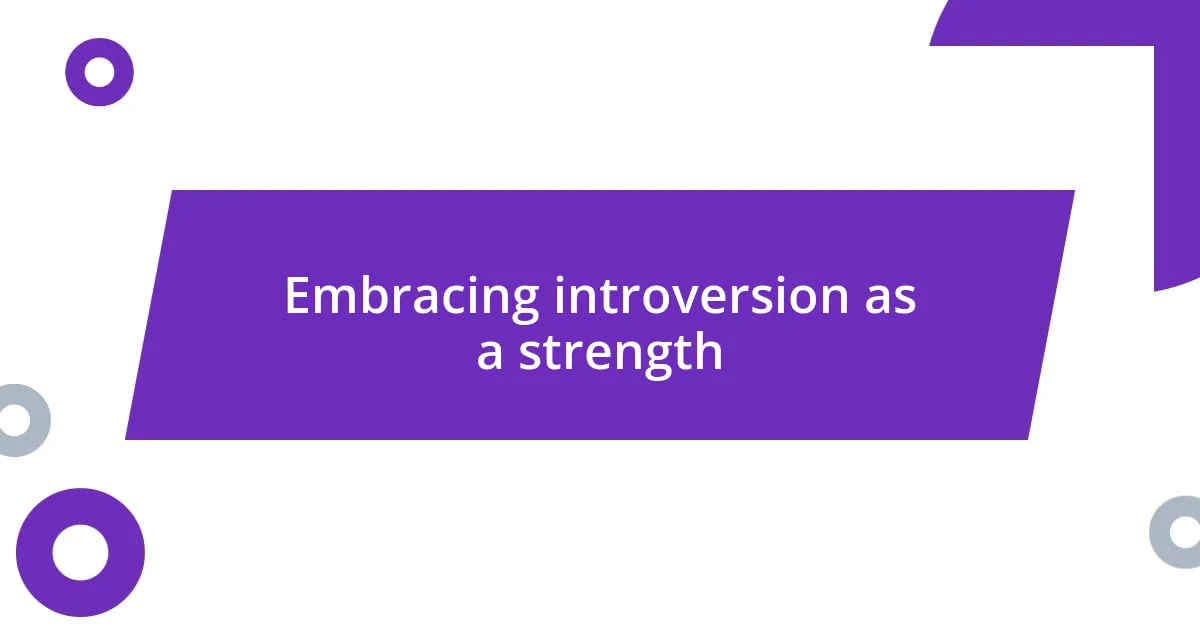
Embracing introversion as a strength
Embracing introversion can indeed be a powerful strength. I often find that my introspective nature allows me to observe and understand the dynamics of social settings in a way that some might overlook. For instance, while others dive into small talk, I tend to focus on meaningful connections. It’s as if I’m filtering the noise and honing in on what truly matters—authentic conversations that resonate deeply.
In my experience, one of the greatest advantages of being an introvert is the ability to listen attentively. I remember having a heartfelt conversation with a colleague who was feeling overwhelmed at work. Instead of offering unsolicited advice, I simply listened. I could see the relief wash over them, and it struck me—how often do people just need a sympathetic ear? This aspect of my personality has nurtured strong relationships, making me feel valued in social contexts.
Have you ever noticed how introspective individuals often have rich inner lives? This depth fosters creativity and problem-solving skills, which are vital in both personal and professional settings. I’ve often channeled my thoughts into writing or art, transforming my experiences into something that not only helps me process the world but also inspires others. Embracing my introversion has allowed me to tap into those strengths, proving that quiet reflection can lead to impactful insights.












